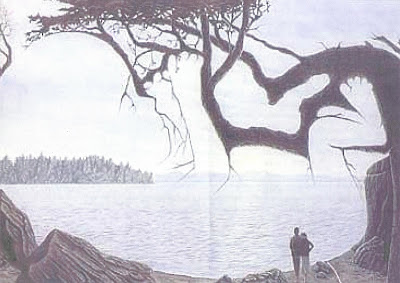
Here is a poem about Passover by Lynn Ungar. It is a beautiful warning about all our hopes for ease and protection. Essentially, all the choices open to us, to stay where it is safe or to plow ahead into unknown territory, bring with them the same results: the angel of death comes for us all, but perhaps we will be able to glimpse the stars along the way.
And by the way: this drawing contains a hidden image. Everything we encounter reveals something unexpected, if we see it fully. Once you see it, you won't be able to not see it.
Passover
Then you shall take some of the blood, and put it on the door posts and the lintels of the houses . . .
and when I see the blood, I shall pass over you, and no plague shall fall upon you to destroy you, when I smite the land of Egypt.
-Exodus 12: 7 & 13
They thought they were safe
that spring night; when they daubed
the doorways with sacrificial blood.
To be sure, the angel of death
passed them over, but for what?
Forty years in the desert
without a home, without a bed,
following new laws to an unknown land.
Easier to have died in Egypt
or stayed there a slave, pretending
there was safety in the old familiar.
But the promise, from those first
naked days outside the garden,
is that there is no safety,
only the terrible blessing
of the journey. You were born
through a doorway marked in blood.
We are, all of us, passed over,
brushed in the night by terrible wings.
Ask that fierce presence,
whose imagination you hold.
God did not promise that we shall live,
but that we might, at last, glimpse the stars,
brilliant in the desert sky.
~ Lynn Ungar ~
(Blessing the Bread)



